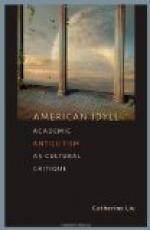I quote here from two letters written by Washington students who had been under his influence but five months.
“May I, as only a student, add my inadequate sympathy for the loss of Dr. Parker—the most liberal man I have known. While his going from my educative life can be nothing as compared to his loss from a very beautiful family group, yet the enthusiasm, the radiance of his personality—freely given in his classes during the semester I was privileged to know him—made possible to me a greater realization of the fascination of humanity than I obtained during my previous four years of college study. I still look for him to enter the classroom, nor shall I soon forget his ideals, his faith in humanity.” From the second letter: “To have known Mr. Parker as well as I did makes me feel that I was indeed privileged, and I shall always carry with me the charm and inspiration of his glorious personality. The campus was never so sad as on the day which brought the news of his death—it seemed almost incredible that one man in five short months could have left so indelible an impress of his character on the student body.”
Besides being of real influence on the campus, he had the respect and confidence of the business world, both labor and capital; and in addition, he stood as the representative of the Government in labor-adjustments and disputes. And—it was of lesser consequence, but oh it did matter—we had money enough to live on!! We had made ourselves honestly think that we had just about everything we wanted on what we got, plus outside lectures, in California. But once we had tasted of the new-found freedom of truly enough; once there was gone forever the stirring around to pick up a few extra dollars here and there to make both ends meet; once we knew for the first time the satisfaction and added joy that come from some responsible person to help with the housework—we felt that we were soaring through life with our feet hardly touching the ground.
Instead of my spending most of the day in the kitchen and riding herd on the young, we had our dropped-straight-from-heaven Mrs. Willard. And see what that meant. Every morning at nine I left the house with Carl, and we walked together to the University. As I think of those daily walks now, arm-in-arm, rain or shine, I’d not give up the memory of them for all creation. Carl would go over what he was to talk about that morning in Introductory Economics (how it would have raised the hair of the orthodox Econ. I teacher!), and of course we always talked some of what marvelous children we possessed. Carl would begin: “Tell me some more about the June-Bug!”




